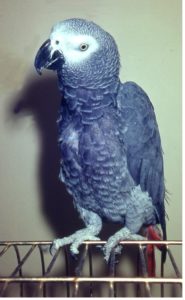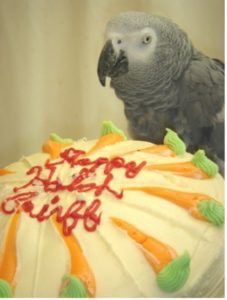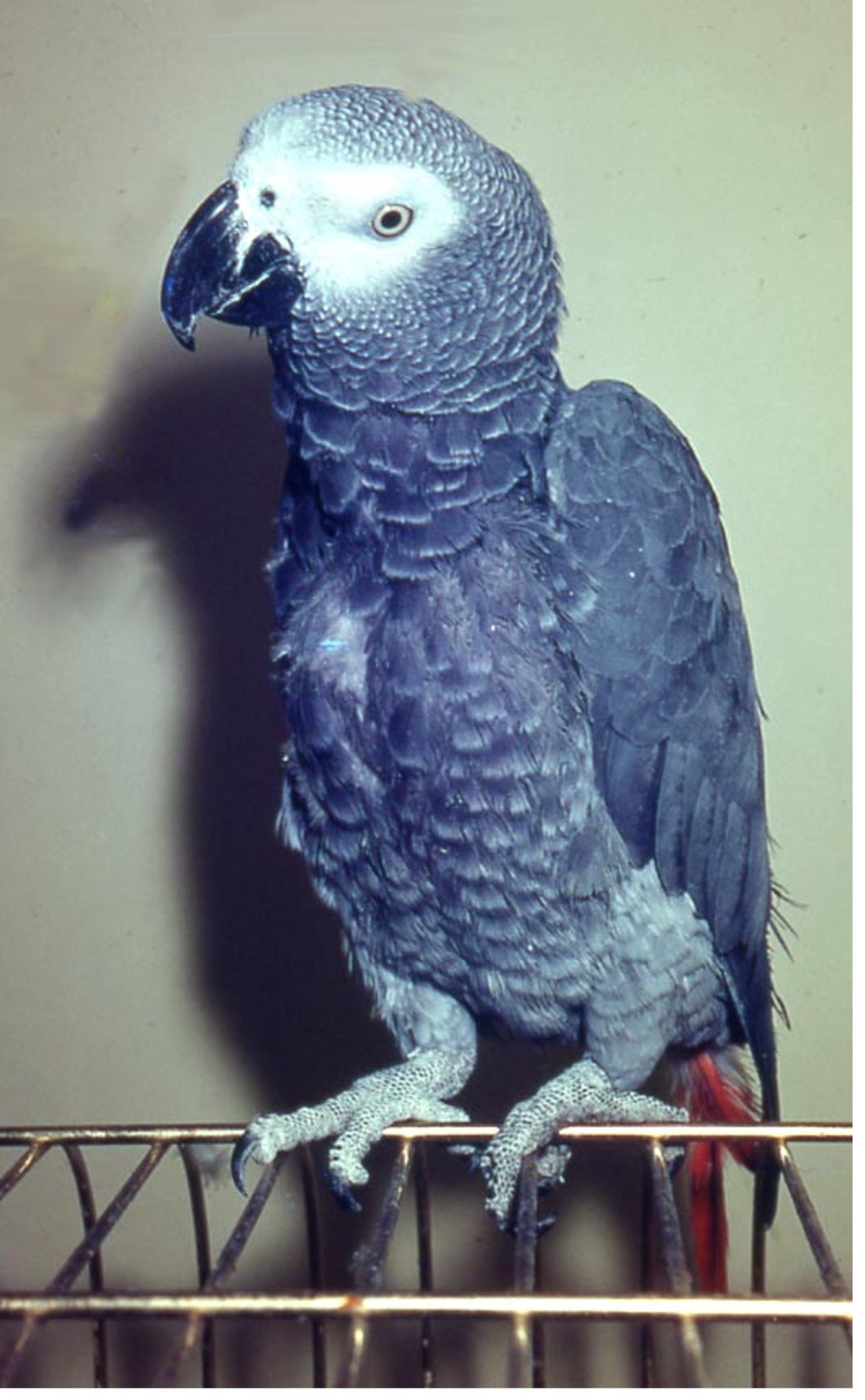
June 15th marked a very special day this year…the 45th anniversary of the start of my work with Alex! The world of avian behavior was very different then: No one believed that birds were intelligent, particularly given their tiny brains that looked nothing like ours. Even the way intelligence was studied was mostly limited to a standard protocol that involved locking a subject in a box and letting it figure out the task by trial-and-error learning (e.g., a red light shines, then a choice of red versus green appears; if red is chosen, initially by chance—a “match”—a reward is given but if green is chosen, again initially by chance—a nonmatch—a time-out occurs).
But there I was, a young woman whose Ph.D. was actually in theoretical chemistry, sitting across from a nervous, roughly year-old African grey parrot, in a very small room in the basement of the Department of Biological Sciences at Purdue University; I believed that parrots were smart and that I could use a then-revolutionary training technique, based on observational learning, to change the way the world thought about a “birdbrain.”
Our path wasn’t easy, and a friend once jokingly said that it was littered with the remains of those who said it couldn’t be done. And it certainly wasn’t done alone. First and foremost, was Alex, who was picked by chance from among nine other young Grey parrots in a pet store…he could have ended up anywhere else! My initial co-workers were also so very important: I started with a very few undergraduates, some high school volunteers, and even some other faculty wives who were determined to help me make more of a place for myself at the university than they had managed. Without them, I could not have put my plan into effect.
I was lucky that a new assistant professor could loan space to me that he initially wasn’t using. And, of course, I’ll never forget the department head, who said that if I could get the dean to agree to let me submit a federal grant without having a faculty appointment (something totally against established protocol), he’d let it proceed (he never thought I could do it, but he kept his end of the bargain).
Of course, there was Dietmar Todt, who had published a short article in a German journal (thankfully in English!), outlining the modeling technique he had used to train a Grey parrot to duet with him—the first stage in two-way communication, and the basis for the Model/Rival observational learning technique that we successfully used with Alex. Even my then-husband who, if not exactly fully supportive, at least initially tolerated the endless hours I spent in the lab rather than with him. And although my first grant came back, literally asking me what I was smoking (well, it was the 70s!), reviewers of my second grant thought it was worth giving me a tiny bit of money for a year to see what I could accomplish.
To say that Alex and I hardly had a fairy tale existence was putting it mildly; our lives were often more like the old-fashioned Perils of Pauline weekly cinema series, where the heroine endlessly lurches from one crisis to another, leaving the audience to wonder about her survival until the next episode. We dealt with endless moves and temporary positions, losses of grants, and often outright antagonism from colleagues.

Alex Shakes Up the Academic World
But, over the years, we persisted…when grants ran out, we received both small and generous donations from innumerable individuals. When one position vaporized, we found another. When colleagues said that birds couldn’t do “X”, we designed careful, complicated experiments and Alex showed that the “experts” were wrong. We published paper after paper, and I’ve written about some of his achievements here. He showed abilities comparable to that of a young child, even with a brain the size of shelled walnut and despite being separated from us by over 300 million years of evolution. He also eventually—grudgingly—helped train our younger parrots, after realizing that aiding us was another way to show off his own intelligence.
When he died, after being with me for 30 years, I was totally devastated, and the world seemed to mourn with me…his obituary was printed all over the world, most notably in places like the last page of The Economist (usually reserved for world leaders, or notables like Pavarotti) and in the New York Times. The lab received thousands of letters, thousands more emails and phone calls; interviews for the media went on for weeks. And that was well before things like Facebook or Twitter….
Building a Legacy
The work continues, supported by our generous donors—with Griffin, for a time with Arthur, and now with the addition of Athena. Griffin has actually exhibited abilities well beyond those of Alex. However, he rarely gets nearly the same level of media attention, probably because he isn’t the ‘first’, and many other labs, inspired by our work, have been demonstrating other amazing avian capacities. ‘Tis a bit sad for Griffin, but wonderful for the field! In any case, he, Athena, and sometimes two pet birds, Pepper and Franco (who belong to a couple who have worked in the lab), have demonstrated several advanced capacities; again, I’ve written about many of their exploits here. Needless to say, we should no longer consider the term ‘birdbrain’ an insult!

We hope to continue our research, with the help of our donors (on whom we now exclusively depend!), for the foreseeable future. In the short-term, I plan to work with my research assistants to see how Grey parrots respond to further studies involving various forms of logic, exclusion, optical illusions, contrafreeloading (working for rewards that could be obtained for free), and auditory perception. In the long-term, I plan to hand the reins over to my post-doctoral fellow, Dr. Suzanne Gray, who intends to pursue a faculty position; she will continue some of these projects and continue working on and developing numerous ones of her own.
So, hopefully, 45 years from now, Suzanne will be writing something akin to this missive: Describing her life with Grey parrots—presumably with fewer hiccups than I’ve had along the way—thanking large numbers of people for their assistance and explaining how she plans to turn over the reins to the next generation.
You can help Dr. Pepperberg continue the groundbreaking parrot research she began 45 years with Alex, the African grey parrot who won admirers from around the world with his cognitive abilities. The Alex Foundation has a “Donate” button linked to PayPal. Visit http://alexfoundation.org and click on the “Support Us” link for more information.
